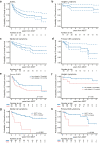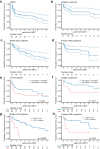The role of autologous stem cell transplantation (ASCT) in aggressive B-cell lymphomas: real-world data from a retrospective single-center analysis
- PMID: 34477953
- PMCID: PMC8510902
- DOI: 10.1007/s00277-021-04650-5
The role of autologous stem cell transplantation (ASCT) in aggressive B-cell lymphomas: real-world data from a retrospective single-center analysis
Abstract
Patients with high-risk or relapsed aggressive B-cell lymphomas are characterized by poor prognosis. High-dose chemotherapy followed by autologous stem cell transplantation (ASCT) can induce durable remissions in these patients and is potentially curative. Two hundred forty-seven patients with aggressive B-cell lymphomas treated with high-dose chemotherapy and ASCT, either as consolidation after first-line therapy or after salvage therapy for relapsed disease, between 2002 and 2019 at the University Hospital Muenster, were analyzed. The median follow-up of surviving patients was 36 months (range 0-163). Progression-free survival (PFS) and overall survival (OS) after 3 years was 63% and 68%, respectively. After ASCT, 28% of all patients experienced a relapse. The cumulative incidence of non-relapse mortality at day 100 after ASCT was 4%. Multivariate analysis identified remission status at ASCT, age at ASCT, and the numbers of infused CD34+ cells as independent prognostic factors for both PFS and OS. Patients with mantle cell lymphoma (MCL) or primary CNS lymphoma (PCNSL) treated with ASCT in first-line had a superior OS and PFS when compared to patients treated with ASCT in relapsed disease. For patients with diffuse large B-cell lymphoma (DLBCL) and Hodgkin lymphoma (HL), early relapse (< 12 months) after first-line therapy showed a trend towards an inferior PFS and OS. Deaths after ASCT were predominantly caused by lymphoma relapse and/or progression (64%) or due to infections (23%). In conclusion, high-dose chemotherapy followed by ASCT in the era of novel targeted agents remains a feasible and effective approach for patients with high-risk or relapsed aggressive B-cell lymphomas. Remission status and age at ASCT, and the number of infused stem cells were of prognostic relevance.
Keywords: Aggressive B-cell lymphoma; Autologous stem cell transplantation; DLBCL; HL; MCL; PCNSL; Prognostic factors.
© 2021. The Author(s).
Conflict of interest statement
The authors declare no competing interests.
Figures



References
-
- Pfreundschuh M, Kuhnt E, Trumper L, Osterborg A, Trneny M, Shepherd L, Gill DS, Walewski J, Pettengell R, Jaeger U, Zinzani PL, Shpilberg O, Kvaloy S, de Nully BP, Stahel R, Milpied N, Lopez-Guillermo A, Poeschel V, Grass S, Loeffler M, Murawski N. CHOP-like chemotherapy with or without rituximab in young patients with good-prognosis diffuse large-B-cell lymphoma: 6-year results of an open-label randomised study of the MabThera International Trial (MInT) Group. Lancet Oncol. 2011;12(11):1013–1022. doi: 10.1016/s1470-2045(11)70235-2. - DOI - PubMed
-
- Crump M, Neelapu SS, Farooq U, Van Den Neste E, Kuruvilla J, Westin J, Link BK, Hay A, Cerhan JR, Zhu L, Boussetta S, Feng L, Maurer MJ, Navale L, Wiezorek J, Go WY, Gisselbrecht C. Outcomes in refractory diffuse large B-cell lymphoma: results from the international SCHOLAR-1 study. Blood. 2017;130(16):1800–1808. doi: 10.1182/blood-2017-03-769620. - DOI - PMC - PubMed
-
- Van Den Neste E, Schmitz N, Mounier N, Gill D, Linch D, Trneny M, Milpied N, Radford J, Ketterer N, Shpilberg O, Dührsen U, Ma D, Brière J, Thieblemont C, Salles G, Moskowitz CH, Glass B, Gisselbrecht C. Outcome of patients with relapsed diffuse large B-cell lymphoma who fail second-line salvage regimens in the International CORAL study. Bone Marrow Transplant. 2016;51(1):51–57. doi: 10.1038/bmt.2015.213. - DOI - PubMed
-
- Engert A, Diehl V, Franklin J, Lohri A, Dörken B, Ludwig WD, Koch P, Hänel M, Pfreundschuh M, Wilhelm M, Trümper L, Aulitzky WE, Bentz M, Rummel M, Sezer O, Müller-Hermelink HK, Hasenclever D, Löffler M. Escalated-dose BEACOPP in the treatment of patients with advanced-stage Hodgkin’s lymphoma: 10 years of follow-up of the GHSG HD9 study. J Clin Oncol. 2009;27(27):4548–4554. doi: 10.1200/jco.2008.19.8820. - DOI - PubMed
-
- Borchmann P, Haverkamp H, Diehl V, Cerny T, Markova J, Ho AD, Eich HT, Mueller-Hermelink HK, Kanz L, Greil R, Rank A, Paulus U, Smardova L, Huber C, Dörken B, Nerl C, Krause SW, Mueller RP, Fuchs M, Engert A. Eight cycles of escalated-dose BEACOPP compared with four cycles of escalated-dose BEACOPP followed by four cycles of baseline-dose BEACOPP with or without radiotherapy in patients with advanced-stage Hodgkin’s lymphoma: final analysis of the HD12 trial of the German Hodgkin Study Group. J Clin Oncol. 2011;29(32):4234–4242. doi: 10.1200/jco.2010.33.9549. - DOI - PubMed
MeSH terms
LinkOut - more resources
Full Text Sources

